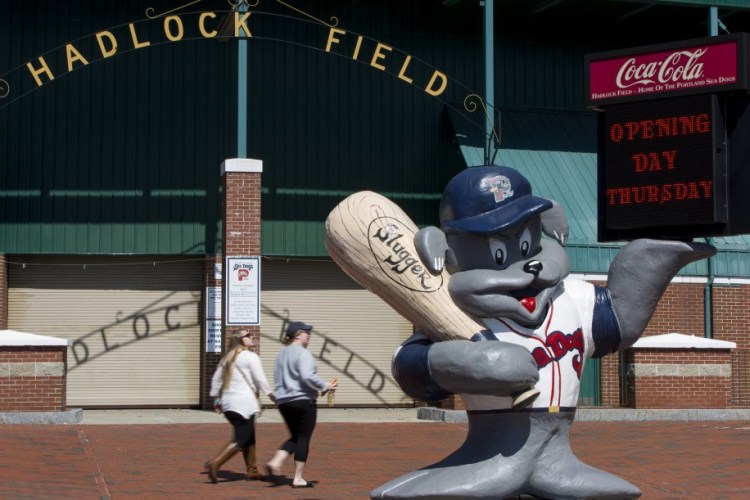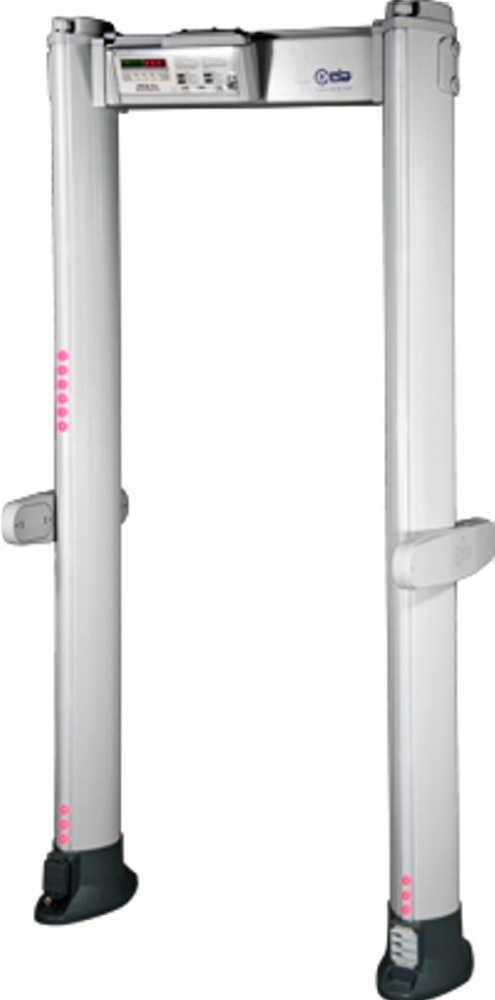Watching a Portland Sea Dogs baseball game provides a chance to lose yourself for nine innings.
But the 2016 season at Hadlock Field, which begins Thursday evening, will offer a dose of reality. Before fans pick up their scorecards and find their seats, they will walk through a metal detector.
The Sea Dogs are following the lead of Major League Baseball by using metal detectors as a precaution against weapons being brought into the ballpark.
“We don’t expect anything to happen. It never has happened,” said Geoff Iacuessa, the Sea Dogs general manager. “We wanted to be proactive.”
But at a ballgame, letting real-world concerns invade the national pastime?
“It’s unfortunately the direction that we’re headed,” said Roger Knight of South Portland, a Sea Dogs season-ticket holder. “It’s one of those things. You hate to think that you have to do it, but it’s surprising they didn’t do it earlier.”
Iacuessa said the Sea Dogs’ administrative staff has discussed metal detectors for years, even though minor league baseball teams are not mandated to use them.
But after Major League Baseball required metal detectors at each of its ballparks in 2015, the Sea Dogs decided to follow suit. Iacuessa sought advice from the Sea Dogs’ parent club, the Boston Red Sox, as well as the city of Portland, which owns Hadlock Field and uses metal detectors at its waterfront facilities.
Minor League Baseball does not keep data on metal detectors, but spokesman Jeff Lantz knew of only two teams – the Sea Dogs and the Rainiers in Tacoma, Washington – that are using metal detectors, both beginning this season.
The Carolina Mudcats, in Raleigh, North Carolina, have security personnel use wand metal detectors for specified games.
“With 9/11 and all that kind of stuff, we’re just making sure everything is fine,” said Mudcats general manager Joe Kremer.
LIMITING FAN INCONVENIENCE
The Maine Red Claws began using the wands this season at the Portland Expo. Team President Dajuan Eubanks said the procedure was a mandate from the parent league, the National Basketball Association.
“It wasn’t that big of an adjustment,” Eubanks said. “It took a game or two for the fans to get used to it … taking a few extra minutes to get into the game. But most of the fans understand. Safety is first and foremost.”
Iacuessa’s biggest concern is inconvenience for the fans. His staff has been working with the four new detectors and practiced a run-through Saturday.
“It went well,” Iacuessa said. “Unlike the airport, no one is going to take their coats and shoes off.”
The metal detectors, each 7 feet high and 3 feet wide, will be set up in front of the turnstiles.
Iacuessa said fans can walk through the detectors without taking anything out of their pockets. Fans will be stopped only if there is a concern. All bags, including purses, will continue to be inspected.
“One thing we heard is that the metal detectors are actually faster than the turnstiles and ticket scanners. It shouldn’t gum things up,” Iacuessa said. “Opening day should be a good test for us.”
Thursday’s game will be close to a sellout. Capacity is 7,368 and, as of Wednesday afternoon, 600 tickets remained.
Even before the detectors, firearms weren’t allowed at Hadlock. State law prohibits firearms in any venue that holds a liquor license.
In Tacoma, the Rainers’ metal detectors made their debut on opening day at Cheney Stadium last week. Team President Aaron Artman said there was a long line the first night because of a miscommunication about when fans needed their bags inspected before walking through the detector.
Artman said that glitch was been eliminated.
“We got a few complaints, but, overwhelmingly, people have said they appreciate it. It should make everyone feel safer in the park,” he said.
Like the Sea Dogs, the Rainiers didn’t wait for a mandate to install the metal detectors.
“Just looking at world events, quite frankly … when you consider at any given night we have thousands of people in the ballpark that cannot protect themselves,” Artman said. “It just makes sense to add one more layer of security in the least intrusive way.”
UNFORTUNATE REALITY OF TODAY
Intrusive or not, the detectors are a reminder of the world’s dangers.
“I expect there would be a great range of individual differences in how people react to metal detectors, depending on all kinds of things like whether the person finds them reassuring or jarring, the nature of the machines, the demeanor of the staff,” said Dr. Josh Schoenfeld, chair of the psychology department at St. Joseph’s College in Standish. “But I suspect that most people are aware enough about the unfortunate realities of the world today to accept them as a necessity and not be disturbed.”
Schoenfeld knows all about security, having lived in Israel from 1983-93 “with metal detectors at entrances to most public buildings.” He’s also a baseball fan who has been to Hadlock Field.
“The metal detectors would not bother me personally – aside from the sadness regarding their necessity,” he said.
Season-ticket holder Laurie Pietroski of Falmouth was pleased to hear about the metal detectors. “I’m fine with it. Any kind of crowd is a target,” she said.
Thom Hinton, the Sea Dogs’ official scorekeeper and a longtime season-ticket holder, was a bit dismayed.
“I am not happy that our corner of the world has gotten to the point where these types of precautions are necessary, but here we are,” Hinton said. “I don’t think it will affect me. Once I enter the concourse, all of that – the metal detectors and what they represent – will be behind me.”
Send questions/comments to the editors.




